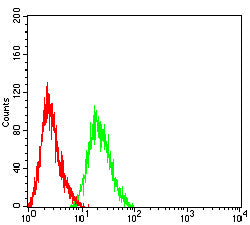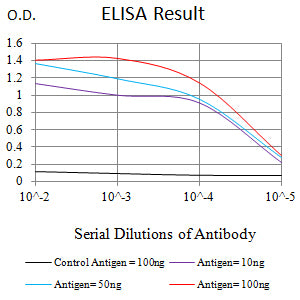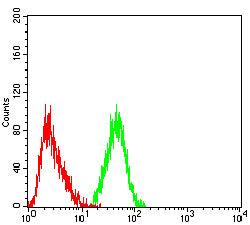


| WB | 咨询技术 | Human,Mouse,Rat |
| IF | 咨询技术 | Human,Mouse,Rat |
| IHC | 1/50-1/100 | Human,Mouse,Rat |
| ICC | 技术咨询 | Human,Mouse,Rat |
| FCM | 咨询技术 | Human,Mouse,Rat |
| Elisa | 1/10000 | Human,Mouse,Rat |
| Aliases | CR2; CR; C3DR; CVID7; SLEB9 |
| Entrez GeneID | 1380 |
| clone | 2D2H6 |
| WB Predicted band size | 112.9kDa |
| Host/Isotype | Mouse IgG1 |
| Antibody Type | Primary antibody |
| Storage | Store at 4°C short term. Aliquot and store at -20°C long term. Avoid freeze/thaw cycles. |
| Species Reactivity | Human |
| Immunogen | Purified recombinant fragment of human CD21 (AA: extra 740-964) expressed in E. Coli. |
| Formulation | Purified antibody in PBS with 0.05% sodium azide |
+ +
以下是关于Acetyl-p53 (Lys382)抗体的3篇参考文献及其摘要概述:
---
1. **文献名称**: *Acetylation of p53 at lysine 382 is required for apoptosis and tumor suppression in vivo*
**作者**: Luo J. et al.
**摘要**: 该研究通过基因编辑技术构建了p53 K382R突变小鼠,发现Lys382位点乙酰化缺失导致p53依赖的细胞凋亡能力下降,并显著增加小鼠自发肿瘤风险。研究利用Acetyl-p53 (Lys382)抗体验证了该位点修饰在体内肿瘤抑制中的关键作用。
---
2. **文献名称**: *Regulation of p53 activity through lysine methylation*
**作者**: Huang J. et al.
**摘要**: 文章揭示了p53的乙酰化(Lys382)与甲基化修饰之间的互作关系。通过Acetyl-p53 (Lys382)抗体进行染色质免疫沉淀(ChIP),发现该位点的乙酰化可拮抗K372甲基化,从而增强p53对促凋亡基因(如BAX)的转录激活能力。
---
3. **文献名称**: *DNA damage-induced acetylation of p53 requires histone acetyltransferases CBP/p300*
**作者**: Liu L. et al.
**摘要**: 研究证实DNA损伤后,组蛋白乙酰转移酶CBP/p300介导p53在Lys382位点的乙酰化。通过Western blot和免疫荧光实验(使用特异性Acetyl-p53抗体),发现该修饰促进p53与靶基因启动子的结合,进而调控细胞周期阻滞和修复机制。
---
这些文献均涉及Acetyl-p53 (Lys382)抗体在机制研究中的应用,涵盖体内功能验证、表观遗传调控互作及DNA损伤应答等领域。如需具体实验方法或临床关联研究,可进一步补充筛选。
The Acetyl-p53 (Lys382) antibody is a specialized tool used to detect acetylation of the tumor suppressor protein p53 at lysine residue 382. p53 plays a central role in regulating cell cycle arrest, DNA repair, apoptosis, and genomic stability in response to cellular stress, such as DNA damage or oncogenic signaling. Post-translational modifications, including acetylation, tightly modulate p53’s activity, stability, and interactions with target genes. Acetylation at Lys382 (human; Lys379 in mice) occurs primarily in the C-terminal regulatory domain of p53. a region critical for modulating its DNA-binding affinity. This modification is catalyzed by histone acetyltransferases (HATs) like p300/CBP and counteracted by deacetylases (HDACs).
Acetylation at Lys382 is associated with enhanced transcriptional activation of p53 target genes, promoting cell cycle arrest or apoptosis. It often occurs in response to DNA damage, hypoxia, or other stress signals. The Acetyl-p53 (Lys382) antibody enables researchers to study this specific modification in experimental settings, such as Western blotting, immunoprecipitation, or immunofluorescence, to assess p53 activation status in cancer models, DNA damage studies, or drug screening. Dysregulation of p53 acetylation is linked to tumorigenesis, as mutated or inactivated p53 fails to induce protective responses. This antibody thus serves as a critical reagent in understanding p53’s role in cancer biology, therapeutic resistance, and the functional impact of epigenetic regulation on tumor suppression pathways.
×